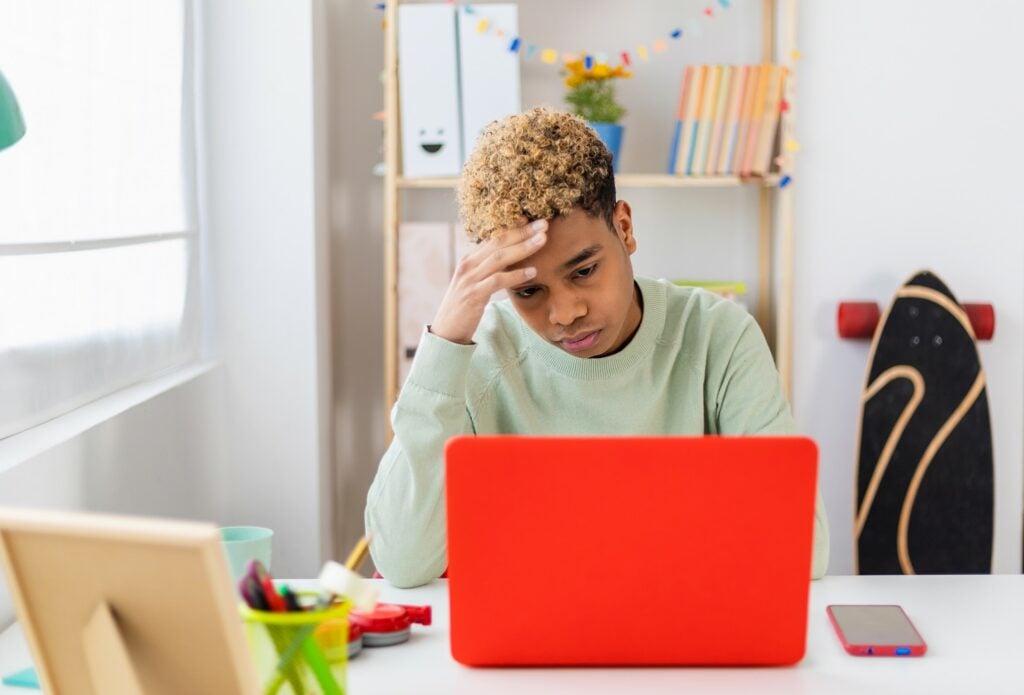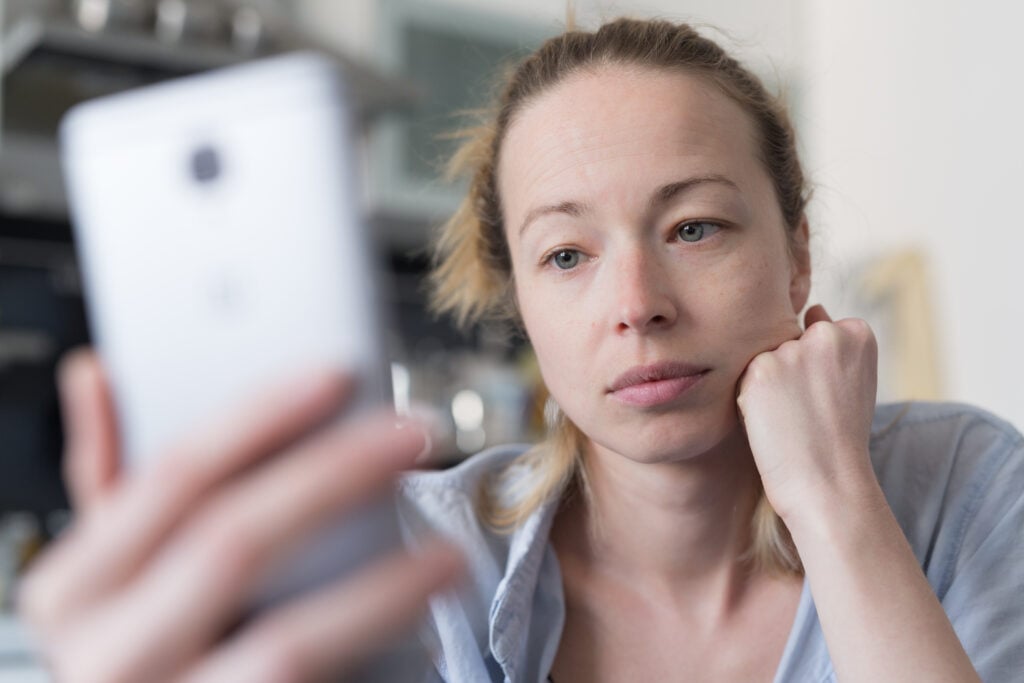Social media and mental health
Reviewed by Robert Bogenberger, PhD

Social media platforms can offer people unique ways to connect, communicate, learn, and work. On the flip side, these channels can also be used to spread misinformation, market products, exploit people, or bully others—and they can have harmful effects on mental health, especially for kids and teens.
Because social media is a complex tool that can deeply affect a person’s well-being, it’s important to understand its risks and benefits, and to learn how to use it healthfully.
Benefits of social media
At its best, social media can help users:
- Connect: Social platforms offer easy ways to stay in touch with family, friends, colleagues, and acquaintances. During the COVID-19 pandemic, social media provided a connective lifeline during isolating stretches of lockdown and quarantine. In addition, LGBTQIA+ users, people of color, people with disabilities, and other people with marginalized identities can find vital support online.
- Learn: Experts including doctors, therapists, scientists, journalists, and educators can share valuable information via social media, often in short and accessible formats.
- Communicate: Social media can offer a forum for sharing perspectives and having constructive discussions.
- Advocate for change: Social media can offer social justice movements visibility and reach, helping people share information and resources, organize gatherings, and contribute to causes. In recent years, Black Americans and other communities of color have used social media to lift up vital efforts to address structural racism.1 In another recent example, mental health concerns have become less stigmatized thanks to growing awareness on social media.
- Open up to others: “Online disinhibition” describes the way some people express certain thoughts and feelings more easily on the internet.2 This can be positive, like when a person feels more comfortable sharing vulnerability and asking for support. But it can also be negative—for example, online disinhibition may also encourage a person to be more aggressive or unkind.
Risks of social media
Alongside its benefits, social media has risks:
- Addiction: Social media is designed to keep users engaged.3 Infinite scrolling, along with algorithms that serve users an endless stream of what they want, encourages users to stay logged in. “Likes,” “favorites,” and other features amplify the rewards of human connection and trigger responses in the brain that can be habit-forming.
- Emotional manipulation: Social media platforms tend to value engagement over accuracy, safety, and helpfulness. Intense emotional reactions are often the strongest factor in that engagement, no matter whether they’re positive (such as celebration) or negative (such as outrage or fear).
- Other mental health concerns: Doomscrolling—which follows the brain’s tendency to dwell on negative news—can contribute to anxiety, depression, stress, fear, anger, insomnia, and other mental health concerns.
- Reinforcement: Algorithms can narrow a person’s social media feed to include only information and people who reinforce their beliefs, even when those beliefs are false or flawed.
- Unrealistic standards and unhealthy comparisons: People often showcase the best parts of their lives on social media, so they come across as better off than they really are. Consuming this media can make someone feel like they can’t measure up, which can play a role in anxiety and depression, eating disorders, and low self-esteem.
- Bullying and harassment: Whether cyberbullies know their victims or are total strangers, their attacks can leave people with lower self-esteem, depression, and even thoughts of suicide. Online harassment is common on social media, and it can take severe forms such as sexual or racial harassment, physical threats, sustained bullying, or stalking.4
- Aggression and outrage: The unique features of online commenting can encourage people to express more aggression, anger, cruelty, or hate than they would in person.5
- Exploitation: Abusers may use social media to gain the trust of vulnerable people—such as kids, teens, or elders—and try to harm them emotionally, physically, or financially.
Impact of social media on kids and teens
Children and teenagers are particularly vulnerable to the effects of social media, both positive and negative.6 Parents and guardians can play an important role in helping kids stay safe on these platforms. Protective actions include:
- Talking with kids about internet safety (physical, emotional, and mental)
- Teaching kids about media literacy
- Knowing which platforms a child spends time on
- Taking breaks from social media
- Ensuring kids aren’t exposed to inappropriate content
- Respecting a child’s privacy in age-appropriate ways
- Monitoring screen time
- Modeling social media moderation in your own life
Caregivers should aim to protect children while preserving their privacy and autonomy. An important first step is modeling healthy behaviors, such as putting your phone away during conversations, dinner, or family time and limiting what you share on social media. Talking about boundaries, bullying, how to separate fact from fiction, and what healthy friendships look like can help your child moderate their own behavior and get more comfortable sharing concerns.
If you’re concerned about your own social media use or a loved one’s, a therapist can help. Browse our directory to find a licensed mental health professional near you.
Sources
1 https://www.pewresearch.org/short-reads/2020/12/11/social-media-continue-to-be-important-political-outlets-for-black-americans/
2 https://www.cambridgeblog.org/2016/05/the-online-disinhibition-effect-20-years-later/
3 https://scopeblog.stanford.edu/2021/10/29/addictive-potential-of-social-media-explained/
4 https://www.pewresearch.org/internet/2017/07/11/online-harassment-2017/
5 https://www.scientificamerican.com/article/why-is-everyone-on-the-internet-so-angry/
6 https://www.apa.org/news/press/releases/2023/02/harms-benefits-social-media-kids/
About the author
The editorial team at therapist.com works with the world’s leading clinical experts to bring you accessible, insightful information about mental health topics and trends.
Related articles

What is digital self-harm, and why are teens doing it?
In an alarming new trend, teens are posting harmful content about themselves...

7 simple steps to a digital detox
A digital detox can help you gain control over your technology intake so you...

Digital technology and mental health
Digital technology has become an essential part of daily life. Learn about the...

TikTok shines a spotlight on mental health, but it can lead to faulty...